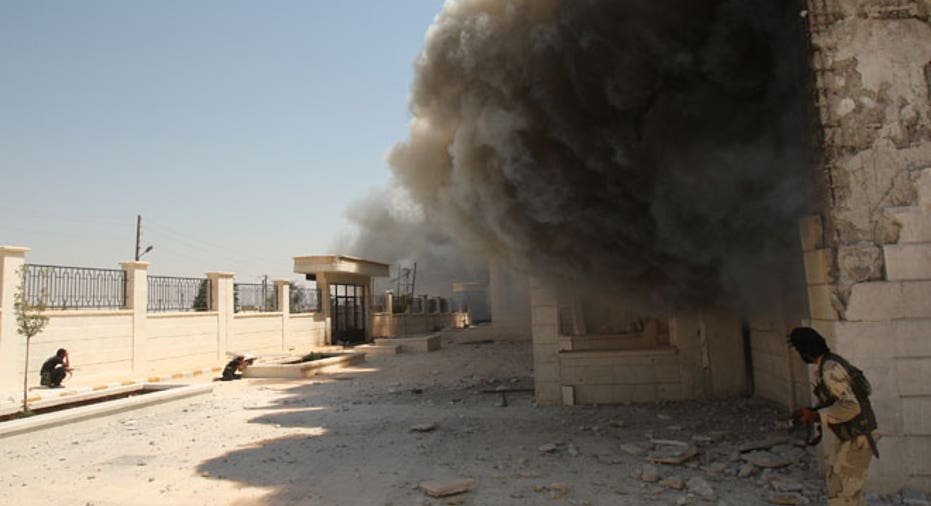Fallout Fears: Looming Conflict With Syria Spooks Wall Street

On top of the Fed’s plans to dial back stimulus and new signs of cracks in the housing rebound, Wall Street now has a fresh concern to add atop its worry list: Syria.
Jitters about the fallout of a military conflict with Syria following the Assad regime’s apparent use of chemical weapons have triggered a wave of selling, highlighted by a triple-digit tumble on Tuesday.
Strong signals Western powers are on the verge of launching military action have added significant uncertainty for investors by lifting oil above $109, raising the specter of becoming entangled in another long war and threatening to inflame relations with Russia and China.
“Any kind of open-ended military conflict is going to spook markets on the way in,” said Nicholas Colas, market strategist at ConvergEx. “Syria is a linchpin for a bunch of different relationships. It opens up a can of worms that we just can’t even begin to imagine.”
These concerns were crystallized by Wall Street’s bearish reaction to Secretary of State John Kerry’s speech on Monday that described the alleged use of chemical weapons “a moral obscenity” and “inexcusable.”
The hawkish and unambiguous nature of Kerry’s speech startled traders, who quickly sent the Dow Industrials diving about 100 points from their highs.
“Bids evaporated across the floor…The trigger, without question, was Syria,” Art Cashin, director of NYSE floor operations at UBS (NYSE:UBS), wrote in a note to clients. “The potential Syria initiative is fraught with danger and complications (regional reactions, terrorist response, etc.) That has markets on edge, since once in motion, it can't be undone.”
Syria Sparks VIX, Oil Price Spike
Investor nervousness has also been displayed by the VIX volatility index, also known as the market’s fear gauge. After sinking to 13.98 on Friday, the VIX has spiked as much as 19.3% in just two days to as high as 16.68 Tuesday afternoon -- its highest level since early July.
“We're extremely concerned,” said Todd Schoenberger, managing partner at LandColt Capital. “One thing is absolutely certain for the outlook in the equity markets: Chaos is here and not likely to subside any time soon.”
Syria, like Egypt, is not a major source of oil, producing just 334,000 barrels per day in 2012, according to the U.S. Energy Information Administration. However, the threat of a U.S. military strike has already driven up energy prices because it reinforces concerns about the already-unstable region.
Crude oil surged as high as $109.32 on Tuesday in response to the latest developments, reaching its highest level since February 2012, according to Dow Jones data.
This is a negative development for equities because higher energy costs threaten to eat into consumers’ ability and willingness to spend on discretionary items. Consumer spending accounts for roughly two-thirds of the U.S. economy.
Fallout Eyed
Outside of the impact on the jittery energy markets, the threat of a conflict with Syria raises questions about how long the U.S. will be involved.
“This is a big source of uncertainty. When are we going to move? How extensively are we going to hit them? Could we get dragged into something protracted?” said Greg Valliere, chief political strategist at Potomac Research Group, which provides policy analysis to investors.
“The U.S. looks awfully tentative and weak right now. If the French for god sakes are urging an attack, it makes our indecision look even more glaring,” he said.
U.S. military forces are prepared to act at a moment’s notice and one senior Defense official told Fox News a strike is “not a matter of if, but when.” NBC News reports an attack could be launched as early as Thursday.
Alastair Newton, geopolitical analyst at Nomura Securities, said in a research note the most likely option is for a “relatively short series of surgical air and missile strikes against key regime installations and ordnance.”
While Newton said this type of “limited strike” would have “few, if any, direct implications,” he warned political and military leaders will want to “weigh carefully” the fallout, including exacerbating regional tensions, civilian deaths in Syria and the risk of Iranian and Russian citizens being “caught up in the action.”
Buying Opportunity?
There are concerns about other unintended consequences, including further hurting relations with Russia, one of Syria’s remaining allies.
“We don’t have a sense of the goals and we don’t know who’s with us -- but we do know Russia is not happy about it,” said Colas, the ConvergEx strategist. “Between Snowden and now Syria, could you imagine a more negative situation between the U.S. and Russia?”
Colas said the best-case scenario for investors would be for Syrian President Bashar al-Assad resigns. The worst-case, he said, would be signs that U.S. ground forces would become seriously involved in combat.
It’s possible that market reaction to the Syria news is being exacerbated by low trading volume ahead of the Labor Day holiday weekend.
The timing has been unfavorable as traders have already been worrying about whether or not the Federal Reserve will slow its bond-buying program and just how healthy the U.S. economy is. Recent reports revealed new home sales in July plunged to their lowest rate since October 2012 and orders for long-lasting goods unexpectedly tumbled 7.3%.
Still, Sam Stovall, chief equity strategist at S&P Capital IQ, said these types of market shocks in the long run tend to be buying opportunities for investors.
Stovall’s research into prior shocks, including the Sept. 11 terrorist attacks, Iraq’s invasion of Kuwait in 1990, the Cuban missile crisis and Pearl Harbor, shows the average first-day decline for the S&P 500 is about 3%.
After the knee-jerk selloff, it took the markets an average of six days to bottom, losing about 6.5% over that span, and then another 55 days to get back to break even.
FOX Business reporter Adam Samson contributed to this report.



















